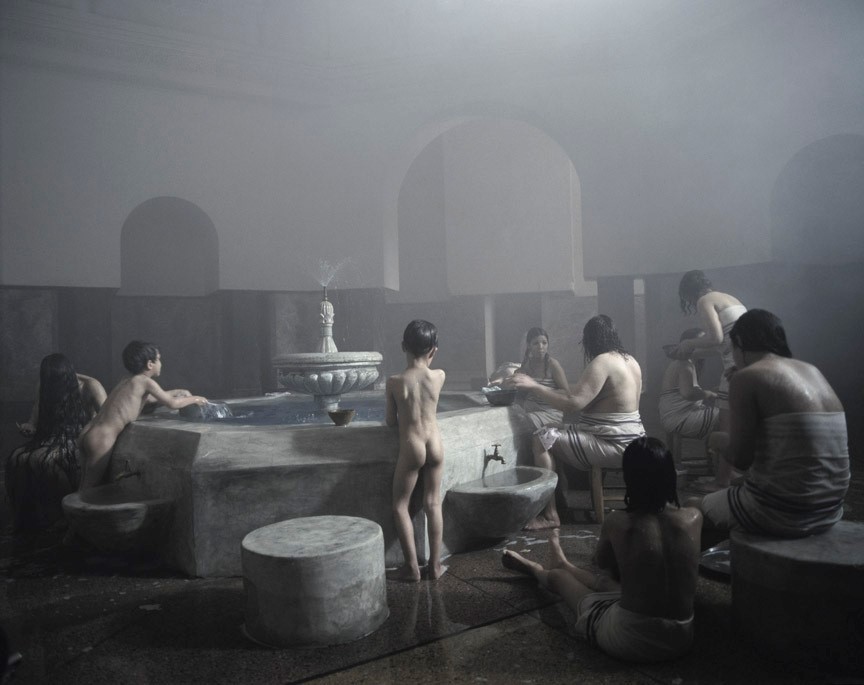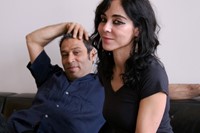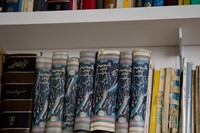Shirin Neshat is one of the most famous female artists in the world. Derek Peck dropped in on her on her birthday, as she was preparing for the release of her already award-winning first feature film.
The day of my visit with Shirin Neshat, the internationally renowned Iranian artist, just so happens to be her birthday. I didn’t know this; she tells me upon my arrival at the Soho loft she shares with her partner (in life and art), Shoja Azari. Although Shirin and I have met a few times before and share friends in common, I feel bad about intruding on her special day for something as mundane as journalism. However, I soon realise she’s not much in the mood for celebrating it anyway. In fact, she seems even to be wishing it away. I don’t understand why people are making such a fuss, she says. I don’t really have time to think about my birthday this year anyway. We’re leaving for Toronto tomorrow and there’s still so much to do.
The “so much” Shirin is referring to has to do with pre-release events and official openings of her first feature film, Women Without Men, in various countries. There are emails and phone calls to answer, travel plans to arrange, screenings and parties to attend, and, of course, a deluge of interviews on the horizon. I’m so glad it’s you today, Shirin says, I can just be myself.
Although a first feature, Women Without Men is no ordinary first movie. For starters, it is directed by one of the most famous female artists in the world. Shirin is known primarily for her photography and video work exploring the complex historical, psychological, and ever-evolving social and political positions of women in the Islamic world. Her depiction of Iranian women bearing arms and with Persian calligraphy written on their faces and bodies in exquisite detail was some of the most beautifully arresting and socially poignant art of the last fifteen years, making her – nearly instantly – one of the art world’s leading female voices. Another reason is that last year Women Without Men was awarded the Silver Lion at the Venice film festival, the second-highest prize handed out there and widely regarded as a best director nod. Obviously this is a huge honour for a first-time director, and a tremendous boost to the movie itself, which caught Shirin completely by surprise.
She takes visible enjoyment in telling me the story, over Iranian tea and a bowl of green raisins and walnuts. It’s the one thing that seems to excite her out of her birthday humbug and the apparent sense of anxiousness that must accompany such breakthrough periods in one’s life. We had just shown in Venice the day before, she says, and we got on a plane to Toronto for the festival there. When we landed in Toronto I got a call that we had won an award – though they wouldn’t tell us which one – and that we should come back. So within twenty-four hours of leaving, we were back in Venice at the awards ceremony. It was completely crazy. As the ceremony went on, and they hadn’t called us yet, I began to think there was a mistake. There weren’t many prizes left and I couldn’t imagine that we’d won one of the top ones. Then it was down to the Gold and Silver Lions, and they called our name. I couldn’t believe it. It was like a miracle and such an honour to be recognized for this work.
After years working in fine art photography and video, Shirin had the chance to direct her first feature, an adaptation of a controversial Persian novella by Shahrnush Parsipur set during the 1953 CIA-backed coup that reinstalled the Shah of Iran. The story recounts the lives of five women set against this socio-political backdrop (although in her film Neshat chose to focus only on four of them). Always poetic and deeply symbolic, Shirin’s style wasn’t an obvious one to develop into narrative film. I had always wanted to make a movie, she says. But I was so intimidated to work with language and dialogue. That was the scariest part for me. Fortunately I had Shoja to collaborate with, and he was incredibly important to the project. We worked together very well. She pauses for an instant and smiles. I think we only blew up at each other once, right? Shoja, who has been tapping away at his laptop, adding details to Shirin’s stories, and smoking a cherished, hand-rolled cigar, smiles back. Yes, about once, he says.
Shoja Azari is a filmmaker in his own right, with his own feature production on the horizon. He has been credited on several of Shirin’s fine art videos as co-writer and co-creator, and is listed as co-director on Women Without Men. In short, the two are natural collaborators, and Shoja’s creative influence combines perfectly with Shirin’s, helping to give her powerful visions and dreamscapes shape and ballast in the familiar world. As in all great relationships, each brings something that the other does not possess; and together they work with the combined gifts as though they had belonged to them all along.
Women Without Men opens in the UK and US in May.
Derek Peck is a New York-based writer, photographer, and the editor and creative director of PLANET Magazine






